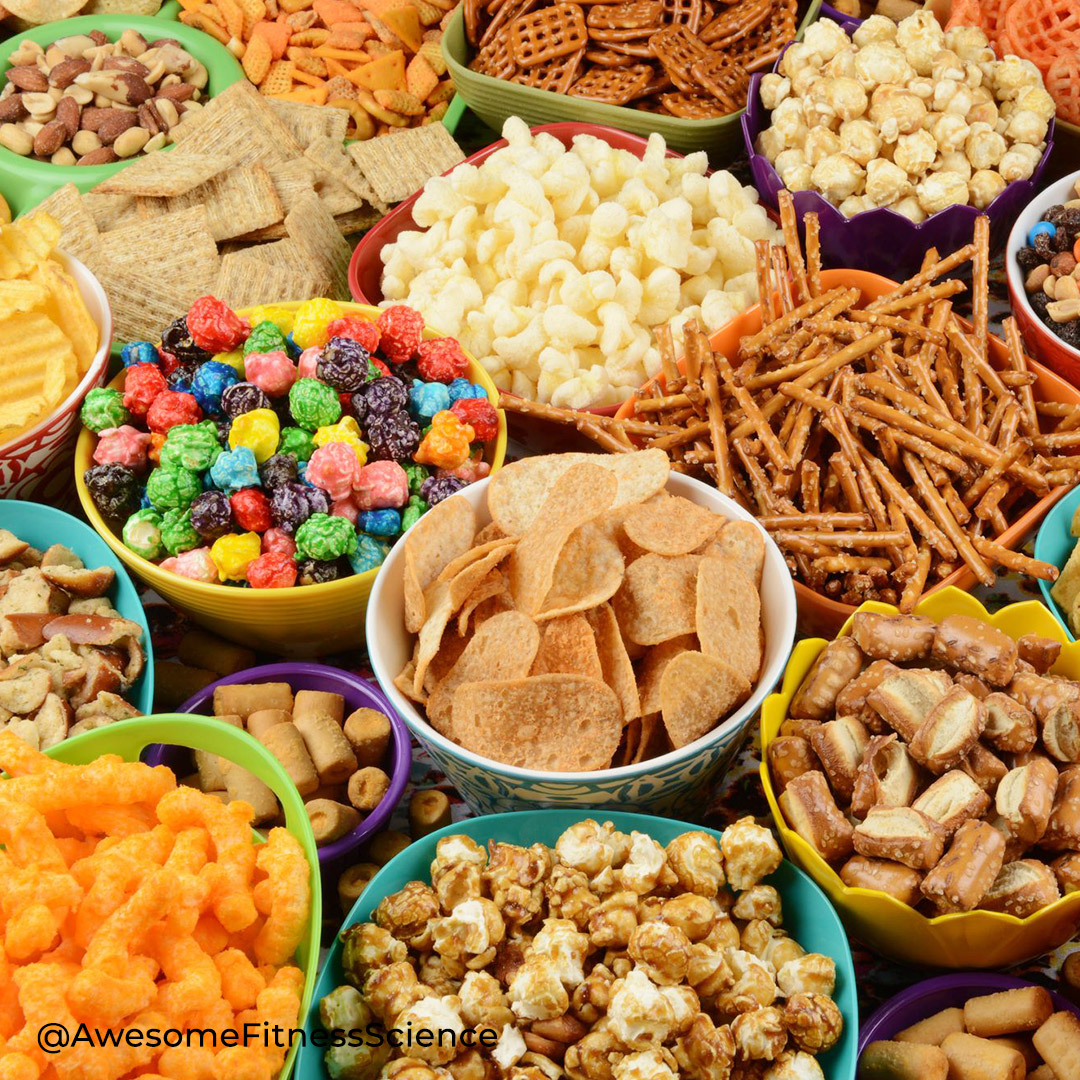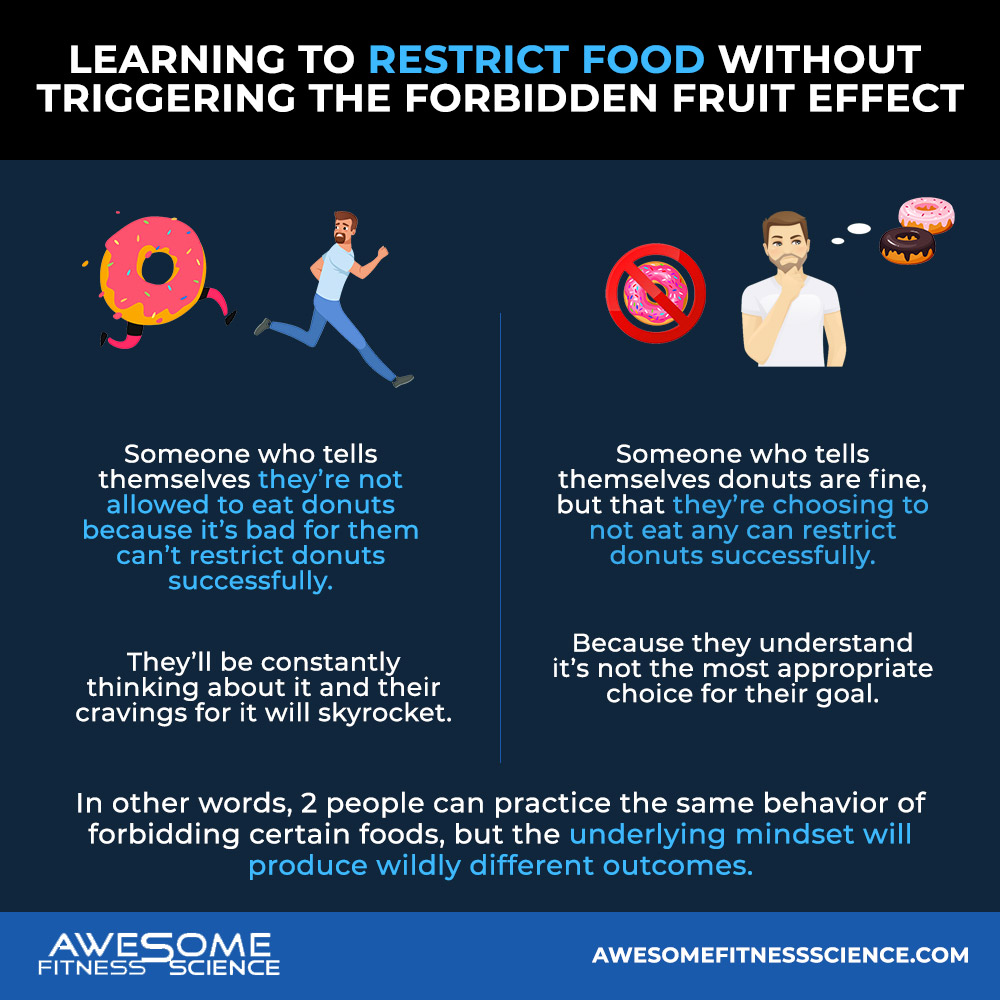
Which Makes You Fatter? Carbs or Fat?
Which Makes You Fatter? Carbs or Fat? When it comes to the three macronutrients, protein is like the golden child. It’s the one that does

The forbidden fruit effect is the idea that restricting certain foods makes you crave them more which ruins your dieting efforts. It gets it’s name from the infamous Adam and Eve story where God forbids them to eat a particular fruit from the tree of good and evil.
Despite every other fruit being allowed, Eve had to gobble up one of them forbidden fruits. Adam shortly followed. Y’all really screwed it up for humanity, but I digress.
Due to the forbidden nature of said fruit, it is speculated the nutrition concept is similar. Does forbidding a food make you crave it more?
Let’s answer this question using science.
The forbidden fruit effect is true when it comes to how you view foods. I’ve discussed in the past about how important being flexible is. Having a flexible mindset and flexible dieting are good things.
So you should view all foods as foods that you’re allowed to eat. You’re not immoral for eating a donut over an apple because food has no morality.
Food simply contain nutrients and provide a response to your body by impacting your health and enjoyment differently. If you enjoy chips, that’s great, eat chips. However, if your health is declining and waistline is expanding, it may be a wise to eat fewer chips and more vegetables. There should be no emotion to this, which is easier said than done of course.
But understanding this foundation is critical before you start any diet. If you view foods as good or bad, the diet is set up to fail. The forbidden fruit effect will take place making you feel deprived (1-4). You’ll crave the very thing you’re actively avoiding.
It will feel like the restriction is imposed on you making you feel out of control which can also lead to binge eating while drowning in guilt.
However, if you accept that no food is off limits, but you yourself are imposing restrictions to be wise, you’ve taken back control. The forbidden fruit effect will not take place and thus, you can successfully restrict food without craving them.

Unfortunately, some coaches think restriction is always bad, so they tell their clients they can have whatever they want and just try to make it fit your macros, but this backfires also. The model of how we crave foods, fight cravings, and find success with dieting often hinges on restriction.
If you think you can have all your heart desires as long as it fits your macros, you’re living in fantasy land. By nature, a diet is restrictive. Whether, the word restriction is helpful to use or not is up for debate.
Successful dieters understand some sacrifice is part of attaining any worthwhile goal. Accepting this is the difference between understanding you’re paying a necessary cost or obsessively whining about your diet sucking your life away (5).
In fact, plenty of extreme restriction studies find dieters don’t get increases in food cravings (13,14). Sticking to only certain foods can produce the same level of adherence and fat loss as more flexible dieting (15).
An overwhelmingly common trait of successful dieters is not giving into their cravings (6,7,8,12).
So if you can put 2 and 2 together, successful dieting comes down to understanding you can eat whatever you want (after all, you’re an adult silly), but actively choosing not to. Think of it as following suggestions as opposed to being trapped by shackles against your will (16).
Someone who tells themselves they’re not allowed donuts because it’s bad for them, can’t restrict donuts successfully. The forbidden fruit effect will skyrocket their cravings.
However, someone who tells themselves donuts are fine, but they’re choosing to not eat any because they take up too many calories, can abstain for donuts without the forbidden fruit effect increasing their cravings.
In other words, 2 people can practice the same behavior of forbidding a certain food, but the underlying mindset will produce wildly different outcomes.

Fortunately, some people don’t have to abstain from specific foods if they can eat what they desire within their macros. That’s the dream.
However, many people have trigger foods that triggers them to eat more without restraint. It can be too difficult to eat these tasty foods in moderation or to stay satisfied on them on such a low calorie budget. Thus, these foods should be restricted.
Conventional wisdom would tell you to give in to trigger foods to keep you satisfied. This can work, but often does the opposite. The reason you crave certain foods so much is because you keep eating those foods (9,10). In fact, how much you give into a craving matters less than how frequent because frequency keeps the craving fresh in your mind (11).
To get rid of your sabotaging craving, you have to starve it away or at least reduce the opportunities to eat them. The ones you think about most are probably what sabotage your diet the most as well (30).
All of the IIFYM fanboys are losing their crap hearing this because they think everyone can simply flexible diet their way to daily cookies and pop tarts. Again, flexibility is great for the mindset, but your practical diet often requires specific restrictions and boundaries within that flexibility.
Here’s another angle to put things into perspective. Imagine a friend of yours recently got out of a toxic relationship with her emotionally abusive boyfriend. She still misses him and craves time with him though.
You would never say, “The healthiest approach is to just hit him up every weekend to satisfy that itch.”
That would be absurd advice. Instead, you’d tell her to starve him our of her life even though it won’t be easy at first.
A bit of an extreme example, but you do the same with sabotaging food cravings once you’ve clearly identified them. It will suck at first to reduce exposure, but when done properly and consistently enough, successful dieting occurs without craving those foods.
In fact, research finds when abstaining from certain high calorie foods or specific trigger foods, it increases your liking for nutritious foods and decreases your preference for junkish food while rewiring their brain to have healthier reward responses to food (11,17-29).
This is also why so many diet cults exist. If people do a diet long enough, they start to prefer the foods within that diet. In other words, you crave what you like and you like what you eat and thus, rave about what you’re exposed to.
If you restrict certain foods because you think they’re bad for you or makes you a bad person, you will crave those foods more. That’s the forbidden fruit effect.
However, restricting certain trigger foods is likely practical for dieting success and research shows it can be done without triggering the forbidden fruit effect so long as your mindset understands the reasoning behind why.
This means to have a flexible mindset of being able to eat whatever you want, but choosing not to because certain foods are not worth it for your goals.
If you can reduce your exposure or abstain long enough from those unhelpful foods, you can rewire your brain towards a healthier desire for that food in the future as well.
1.
S;, Barnes. “Food for Thought: Examining the
Relationship between Food Thought Suppression and Weight-Related Outcomes.” Eating
Behaviors, U.S. National Library of Medicine, https://pubmed.ncbi.nlm.nih.gov/20434065/.
2.
J;, Richard. “Effects of Chocolate Deprivation on
Implicit and Explicit Evaluation of Chocolate in High and Low Trait Chocolate
Cravers.” Frontiers in Psychology, U.S. National Library of Medicine,
https://pubmed.ncbi.nlm.nih.gov/28955287/.
3.
Blechert. “Startling Sweet Temptations: Hedonic
Chocolate Deprivation Modulates Experience, Eating Behavior, and Eyeblink
Startle.” PloS One, U.S. National Library of Medicine,
https://pubmed.ncbi.nlm.nih.gov/24416437/.
4.
SI;, Rideout. “‘Restrained Eating’ vs ‘Trying to Lose
Weight’: How Are They Associated with Body Weight and Tendency to Overeat among
Postmenopausal Women?” Journal of the American Dietetic Association,
U.S. National Library of Medicine, https://pubmed.ncbi.nlm.nih.gov/19394476/.
5.
Gilhooly . “Food Cravings and Energy Regulation: The
Characteristics of Craved Foods and Their Relationship with Eating Behaviors
and Weight Change during 6 Months of Dietary Energy Restriction.” International
Journal of Obesity (2005), U.S. National Library of Medicine,
https://pubmed.ncbi.nlm.nih.gov/17593902/.
6.
Batra . “Relationship of Cravings with Weight Loss and
Hunger. Results from a 6 Month Worksite Weight Loss Intervention.” Appetite,
U.S. National Library of Medicine, https://pubmed.ncbi.nlm.nih.gov/23684901/.
7.
M;, Lim. “Psychological Effects of Prescriptive vs
General Lifestyle Advice for Weight Loss in Young Women.” Journal of the
American Dietetic Association, U.S. National Library of Medicine,
https://pubmed.ncbi.nlm.nih.gov/19857635/.
8.
Gibson, E.l., and E. Desmond. “Chocolate Craving and
Hunger State: Implications for the Acquisition and Expression of Appetite and
Food Choice.” Appetite, Academic Press, 25 May 2002,
https://www.sciencedirect.com/science/article/abs/pii/S0195666398902070.
9.
R;, Chao. “Food Cravings, Food Intake, and Weight
Status in a Community-Based Sample.” Eating Behaviors, U.S. National
Library of Medicine, https://pubmed.ncbi.nlm.nih.gov/25064302/.
10. Apolzan.
“Frequency of Consuming Foods Predicts Changes in Cravings for Those Foods
during Weight Loss: The Pounds Lost Study.” Obesity (Silver Spring, Md.),
U.S. National Library of Medicine, https://pubmed.ncbi.nlm.nih.gov/28618170/.
11. Marlatt
. “Persistence of Weight Loss and Acquired Behaviors 2 y after Stopping a 2-y
Calorie Restriction Intervention.” The American Journal of Clinical
Nutrition, U.S. National Library of Medicine,
https://pubmed.ncbi.nlm.nih.gov/28275127/.
12. M;,
Harvey. “Effects on Food Cravings of a Very Low Calorie Diet or a Balanced, Low
Calorie Diet.” Appetite, U.S. National Library of Medicine,
https://pubmed.ncbi.nlm.nih.gov/8285649/.
13. L;,
Martin. “Changes in Food Cravings during Low-Calorie and Very-Low-Calorie
Diets.” Obesity (Silver Spring, Md.), U.S. National Library of Medicine,
https://pubmed.ncbi.nlm.nih.gov/16493129/.
14. Conlin,
Laurin Alexandra, et al. “Flexible vs. Rigid Dieting in Resistance-Trained
Individuals Seeking to Optimize Their Physiques: A Randomized Controlled Trial
– Journal of the International Society of Sports Nutrition.” BioMed Central,
BioMed Central, 29 June 2021,
https://jissn.biomedcentral.com/articles/10.1186/s12970-021-00452-2.
15. Stok.
“Communicating Eating-Related Rules. Suggestions Are More Effective than
Restrictions.” Appetite, U.S. National Library of Medicine,
https://pubmed.ncbi.nlm.nih.gov/25246032/.
16. Anton.
“Diet Type and Changes in Food Cravings Following Weight Loss: Findings from
the Pounds Lost Trial.” Eating and Weight Disorders : EWD, U.S. National
Library of Medicine, https://pubmed.ncbi.nlm.nih.gov/23010779/.
17. Anguah,
Katherene O.-B., et al. “Changes in Food Cravings and Eating Behavior after a
Dietary Carbohydrate Restriction Intervention Trial.” MDPI,
Multidisciplinary Digital Publishing Institute, 24 Dec. 2019,
https://www.mdpi.com/2072-6643/12/1/52.
18. Lampuré,
Aurélie, et al. “Sociodemographic, Psychological, and Lifestyle Characteristics
Are Associated with a Liking for Salty and Sweet Tastes in French Adults.” OUP
Academic, Oxford University Press, 28 Jan. 2015,
https://academic.oup.com/jn/article/145/3/587/4743713?login=true.
19. Holt,
S.H.A, et al. “Dietary Habits and the Perception and Liking of Sweetness among
Australian and Malaysian Students: A Cross-Cultural Study.” Food Quality and
Preference, Elsevier, 10 Apr. 2000,
https://www.sciencedirect.com/science/article/abs/pii/S0950329399000762.
20. Sage
Journals: Your Gateway to World-Class Research Journals.
https://journals.sagepub.com/.
21. Riskey,
Dwight R., et al. “Effects of Context in Judgments of Sweetness and
Pleasantness – Attention, Perception, & Psychophysics.” SpringerLink,
Springer-Verlag, https://link.springer.com/article/10.3758/BF03199865.
22. Deckersbach,
T, et al. “Pilot Randomized Trial Demonstrating Reversal of Obesity-Related
Abnormalities in Reward System Responsivity to Food Cues with a Behavioral
Intervention.” Nature News, Nature Publishing Group, 1 Sept. 2014,
https://www.nature.com/articles/nutd201426.
23. Nock
. “Reduction in Neural Activation to High-Calorie Food Cues in Obese
Endometrial Cancer Survivors after a Behavioral Lifestyle Intervention: A Pilot
Study.” BMC Neuroscience, U.S. National Library of Medicine,
https://pubmed.ncbi.nlm.nih.gov/22731395/.
24. Buckland
. “A Low Energy-Dense Diet in the Context of a Weight-Management Program
Affects Appetite Control in Overweight and Obese Women.” The Journal of
Nutrition, U.S. National Library of Medicine,
https://pubmed.ncbi.nlm.nih.gov/30053284/.
25. Anguah.
“Can the Palatability of Healthy, Satiety-Promoting Foods Increase with
Repeated Exposure during Weight Loss?” Foods (Basel, Switzerland), U.S.
National Library of Medicine, https://pubmed.ncbi.nlm.nih.gov/28231094/.
26. Martin,
Corby K., et al. “Change in Food Cravings, Food Preferences, and Appetite
during a Low‐Carbohydrate and Low‐Fat Diet.” Wiley Online Library, John
Wiley & Sons, Ltd, 6 Sept. 2012,
https://onlinelibrary.wiley.com/doi/full/10.1038/oby.2011.62.
27. Murdaugh,
Donna L, et al. “FMRI Reactivity to High-Calorie Food Pictures Predicts Short-
and Long-Term Outcome in a Weight-Loss Program.” NeuroImage, U.S.
National Library of Medicine, 1 Feb. 2012,
https://www.ncbi.nlm.nih.gov/pmc/articles/PMC3287079/.
28. He.
“Poor Ability to Resist Tempting Calorie Rich Food Is Linked to Altered Balance
between Neural Systems Involved in Urge and Self-Control.” Nutrition Journal,
U.S. National Library of Medicine, https://pubmed.ncbi.nlm.nih.gov/25228353/.
29. J;,
Richard. “Food Cravings in Everyday Life: An EMA Study on Snack-Related
Thoughts, Cravings, and Consumption.” Appetite, U.S. National Library of
Medicine, https://pubmed.ncbi.nlm.nih.gov/28249745/.
30. Secular
Improvements in Cognitive … – Journals.sagepub.com.
https://journals.sagepub.com/doi/abs/10.1177/08982643211065571.
Grab my free checklist on how to defeat your worst food cravings

Which Makes You Fatter? Carbs or Fat? When it comes to the three macronutrients, protein is like the golden child. It’s the one that does

The fitness industry used to tell you building more muscle will boost your metabolism therefore allowing you to eat more food without fat gain. Fast forward a decade later to present day and coaches are now saying the opposite.

Foam rolling is one of the most controversial topics within the fitness space. Many trainers and massage therapists hold religiously passionate stances for or against foam rolling.